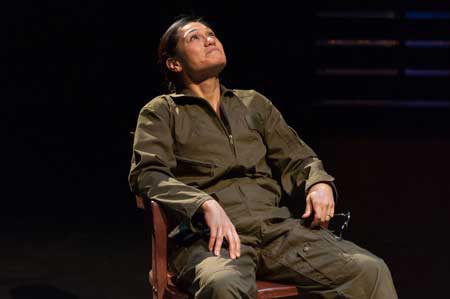Play (2013)
by George Brant
Directed by Lee Mikeska Gardner
Scenic Design: Steven Royal; Lighting Design: Wen-Ling Liao; Sound Design: Dewey Dellay; Production Design: Kathryn Lieber
The Nora Theatre Company
Central Square Theater
Central Square, Cambridge, MA
February 19 – March 22, 2015
With Celeste Oliva (The Pilot)

in “Grounded”
Photo: A.R. Sinclair Photography
Courtesy of Central Square Theater
The Pilot (Celeste Oliva) has been flying inside of planes for the armed forces abroad, drunk with the blue of the sky and the sense of immediacy in combat. Finding herself pregnant, she returns to America, and, after marrying and having her child, re-enters the military work force, but this time as a drone pilot.
Now commuting from home to war, as she puts it, she faces the challenges of controlling airstrikes from her station at work while returning to her loved ones at night. The stresses build as she realizes the consequences of her actions, despite the interventions of great distance and height.
Celeste Oliva is a powerful actress, capable of conveying a character who is tough as nails and who simmers with passionate intensity. (I was impressed by similar qualities in her compelling performance in Becky’s New Car at the Lyric Stage last season.) Her masterful delivery in this one-woman play is precise and focused, effectively building an emotional crescendo, carrying it off compellingly well.
Drone pilot plays seem to be in the air. Walt McGough’s Pattern of Life, a very good, quite similar treatment of a male drone pilot and the character in his cross-hairs, was very effectively produced by the New Repertory Theatre last spring.

in “Grounded”
Courtesy of Central Square Theater
Grounded forces the emotional burden of both gunner and gunned on a single actor who in one breath has to be intently distant and vulnerably open.
In Steven Royal’s simple but effective set, a ring of monitors surrounds the middle of the stage, the themes of surveillance and our never-ending attachment to screens called visibly to mind.
Despite “wanting the sky and wanting the blue…they put me behind a desk, grounded.” And so begin her true woes. Between caring for her daughter and her husband and sitting in front of the grey, drone target screen all day, she ignores the tight ball bearing in my sternum, the growing signal of embodied stress. Getting into the chair to fight a war, she now stares at a grey monitor rather than a blue sky and that contrast of the emblem of dull impersonality versus the richness of the heavens echoes throughout.
And, this, of course, is the heart of the play, the personal account of the individual price paid by those who, as she put it, are half a world away from the place where they target devastation in less than two seconds. As a new member of the “chairforce,” she kisses her daughter goodbye in the morning, then drives to the war like it’s shift work, bearing the outer signs of normality and all the internal signs of catastrophe.
The latter part of the play focuses on her targeting of the desperately sought Number Two enemy leader. From her “office” perch, the Pilot follows his car intently via drone camera. When she finally sees him and the scene is complicated by the presence of a child, her dilemma squarely hits home. The psychological meltdown associated with her role and the military consequences of succumbing to them compound the obvious signficance of the play’s title.
This is a beautifully acted account and an interesting play about contemporary warfare. It vividly evokes a sense of the unique and dire emotional toll exacted by its combined requirements of remoteness, exactness, potency and devastation.
– BADMan
you da bomb